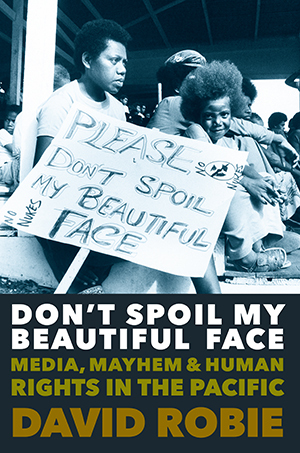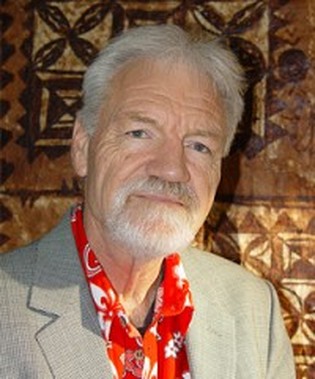
As part of the World Press Freedom Day celebrations, the USP School of Journalism (headed by Pat Craddock) held a Panel Discussion at USP on Friday 2 May 2014, to discuss the topic “Media Freedom and the Fiji General Election”. This certainly was progress of sorts in Fiji, in the run-up to the elections planned for September. But who would have thought that the media reports on the panel discussion would themselves illustrate very clearly how self-censorship continues in Fiji, quite contrary to the MIDA Chairman’s guarantee of protection of the media?
Panelists included Ricardo Morris (publisher of the Republika), Seona Smiles (former Fiji Times senior reporter), Netani Rika (former editor of Fiji Times), Rachna Lal (senior journalist from Fiji Sun), and Ashwin Raj, Chairman of the Media Industry Development Authority (MIDA). The chairperson of the panel was Stanley Simpson, former journalist and a former graduate of the USP Journalism program. Quite interesting for journalists and media outlets was the MIDA Chairman’s declaration that he would protect journalists who remained true to their journalism ethics and reported freely without fear or favor. Mr Ashwin Raj came across as honestly and earnestly attempting to fulfill his duties to the best of his ability, under the existing media laws. But the self-censored reporting of Fiji’s Press Freedom Day also showed that the media editors simply do not believe the assertion by the Chairman of MIDA that he would protect them if they reported fearlessly and fairly.
Critical views censored
Despite the MIDA Chairman’s statements that he would protect the media, the newspapers and television gave very little coverage to some of the more sensitive and critical views of the panelists.
Neither did they give any coverage to the four critical questions of a professor (who has written extensively on media censorship in Fiji) who tried to focus the panel on the topic they had been given- the role of the media in the coming elections:
1. Following on from Mr Ashwin Raj’s declaration that media freedom could not be discussed without a thorough understanding of nature of media ownership, the questioner asked the panel how the media owners could allow their journalists to be fearless in their questioning, when the media owners were not dedicated media operators, but had much wider and more important commercial interests which could be hurt badly by discretionary policies of a hostile government. How indeed could MIDA address the problem of vulnerable media ownership, over which issue it had no legal powers?
2. How could one newspaper report honestly and without fear, when its editor was under a 6 month suspended jail sentence; its owner had been given massive fines over arguably trivial offences; and who remained outside of Fiji while a bench warrant had been issued against him on another minor charge; how could one television station report fearlessly when its license was renewed only a six-monthly basis, clearly intended to be an intimidating measure?
3. How could the voters in the election be educated about the relative merits of competing political parties, when both daily newspapers refused to print most of the critical Letters which subjected the government of the day to greater scrutiny? Why indeed did MIDA allow this media censorship to continue? Mr Ashwin Raj informed the audience that he had asked the newspaper editors to explain why they published some Letters and not others, but to date, he had received no answer from any of them although several weeks had passed). Ms Rachna Lal (of the Fiji Sun), when pressed, also said that she did not know why some of the Professor’s letters were not printed despite being relevant to the issues considered important in the elections.
4. The professor informed the panel that while acts of censorship (such as being banned as Chief Guest at the 2013 World Press Freedom event at USP, or being “disinvited” as Chief Guest at the 2013 Fiji Food Security Day celebrations) were quite obvious to the public, but how could the MIDA Chairman address the far more subtle forms of censorship, such as being silently excluded from the public policy arena since 2009 by all the media (except The Fiji Times in the last three weeks)? These questions, while extremely pertinent to media freedom and the forthcoming elections, were not reported by the print media, nor even by Fiji TV, even though it had a special Close Up program on the Panel Discussion. The MIDA Chairman needs to ask himself why the media did not take up his challenge to be courageous in reporting fairly and freely, despite his promised protection.
Stanley Simpson, a less than neutral chair
One member of the audience accused the organizers of the panel discussion of only inviting Bainimarama Government sympathizers to be on the panel. That view was not correct given the quite critical views expressed by panelists Ricardo Morris, Seona Smiles and Netani Rika, although Ms Rachna Lal expressed her newspaper’s (Fiji Sun’s) broad support for the Bainimarama Government. However, some questions may be leveled at the chairman of the panel, Stanley Simpson and the organizer of the panel discussion, Mr Pat Craddock. Simpson was not the humble investigative journalist of old, but a new personality arrogantly exuding power, who made no bones about wanting to limit critical questions and comments from the floor.
One senior professor, who was fooled for a moment into thinking that the use of his first name by the Chairman indicated some old friendship, was quickly disabused of that notion when the chair tried to shut him down while he was asking his questions. Simpson made no effort to remind the MIDA Chairman to answer the uncomfortable questions put to him from the floor, although Mr Ashwin Raj, to his credit, insisted on answering them at the end of the discussion. Simpson also arrogantly threatened the audience that he would close down the panel discussion if there continued to be interjections from the floor, as there was from a rather passionate lady, who objected to the event being dominated by long responses from one panelist, while the audience could not get a word in edge-ways. Stanley Simpson has also become the Interim Secretary of the newly formed Fijian Media Association for journalists, until they elect their new officials.
A cautious Head of Journalism?
A more interesting unasked question was why Mr Pat Craddock did not invite any academics to be on his panel discussion, whether from the School of Journalism itself, or from the small group of other USP academics who have written much about media freedom and censorship. Well known to Mr Craddock would have been a Professor of Economics who has written many criticisms of media censorship in Fiji, censored from the Fiji media, but available on international outlets such as Cafe Pacific, run by David Robie and his School of Journalism at Auckland University of Technology http://cafepacific.blogspot.com/2013/05/how-media-ownership-in-fiji-chokes.html
Many articles critical of media censorship have therefore had to be published on my personal blog https://narseyonfiji.wordpress.com/ and other blogs. Mr Craddock would have bee aware that this Professor was banned last year by the USP management, from being a Chief Guest at the Journalism students’ celebration of World Press Freedom Day. Did he think that inviting this person to be on the 2014 panel discussion might raise the ire of USP management? Perhaps Craddock was also aware that a previous Head of Journalism (Marc Edge) had fallen foul of the Bainimarama Government, so did he err on the side of caution in not inviting the same critical academic critic to be on the panel?
Whatever the mix of reasons, it leaves Mr Pat Craddock, the new stop-gap Head of Journalism, vulnerable to criticism that he is not averse to practicing self-censorship on Fiji’s Press Freedom Day, just like the media owners and journalists. While the Head of the USP School of Journalism can take some credit for being able to put on a well-publicized and critical panel discussion, Fiji’s Press Freedom has some way to go before it can be the fearless and fair reporter of elections issues, that the MIDA Chairman (Mr Ashwin Raj) wants it to be
_______________________________________________________________________________________
| Don’t Spoil My Beautiful Face: Media, Mayhem and Human Rights in the Pacific Format: paperback, 362pp, illustrated. Index. Date: 24 April 2014: ISBN 978-1877-484-25-4 Publisher: Little Island Press Foreword by Kalafi Moala “This is an extraordinary ‘secret history’ of a vast region of the world of which David Robie has been a rare expert witness. What makes this epic work so timely is that it allows us to understand the Asia-Pacific at a time of renewed Cold War ambitions and dangers.” – Investigative journalist John Pilger Professor David Robie, an independent journalist, media campaigner and educator from AUT University’s Pacific Media Centre, distils his lessons from 35 years of working in the Asia-Pacific region. Covering environmental challenges, coups, the nuclear-free and independent Pacific movement and civil rights – as well as many barriers journalists face in the Pacific – his book, Don’t Spoil My Beautiful Face, reveals many of the hidden stories from these island nations. Review: http://www.pmc.aut.ac.nz/pacific-media-watch/region-mantra-free-press-and-pacifics-political-spoilers-8571 Sedition, e-libel the new media frontline 'Climate of censorship' chills Pacific media scene New free press book a must read for 'media spoilers' New book focusing on 'secret history' of the Pacific [audio] David Robie's new book should be on shelves of Pacific newsrooms New book on South Pacific journalism looks at region's history and challenges David Robie blasts media attackers at book launch [video] |



